【牛津译林版】选修九:Unit4《Behind beliefs》学案
牛津译林版高中英语选修9Unit 4Behind beliefsReading教案1

Step3:Fast reading for general ideas
Go through thepassageas quickly as possible and try to findanswersto thethreequestionsin part A on Page 50. Pay attention to the most important information.
2. In Hebrew.
3.‘Apple of their parents’eye’.
Step4:Detailed reading for important information
1.Read the passage a second time and complete Part C1.
2. Read the article again and complete Part C2.
翻译:
1.甲:噢,天哪!怎么啦?你身上怎么青一块紫一块的?
乙:彼得的弟弟把我给打了。
甲:这坏蛋,咱们来想个法来教训教训他。
2.甲:把冰鞋给我!
乙:你闭嘴!
甲:你若不知道怎么滑冰,干吗不把冰鞋给我?别占着茅坑不拉屎了!
Check the Answers together:
kill the goose that lays the golden eggs( In an ancient Greek legend, there was a farmer and he had a goose that could lay golden eggs. The farmer thought that he could be richer by killing the goose to get all the golden eggs inside. However, the farmer ended up with nothing. Now this idiom refers to destroying something that would bring about something more valuable.)
高中英语Unit4Behindbeliefs教案6牛津译林版选修9

Unit 4 Behind beliefs科目: 英语主备人: 备课日期:课题Behind beliefs 第4课时计划上课日期Enable students to gain some knowledge about idioms, understand their 教学目标original meanings and learn about their pr ac tical usage in English.Students are expected to practice and reinforce their reading 教学重难点comprehension and improve their overall ability.教学流程\内容\板书关键点拨加工润色Step1 GreetingsStep2 RevisionsStep3 Lead-inStep4 Teaching proceduresLanguage points10. refer to1) 提到,谈到We agreed never to refer to the matter again.我们一致同意永远一再提这件事。
Alt hough she didn’t mention any names, everyon e knew who she was referringto.尽管她没有提到任何名字,但大家都知道她指的是谁。
2)参考,查看,查阅Co mplete the exe rcise without referring to a dicti onary.请在不查阅词典的情况下完成练习。
3) 涉及,关于The figures in the left-hand column refer to our sales abroad.左栏里的数字是关于我们海外销售额。
4) 让---去查询,提交(某机构或某人)作决定Professor Watson referred me to an article she had written on the subject. 沃森教授要我去查阅她写的一篇关于这个主题的文章。
高中英语《Unit 4 Behind beliefs》导学案4牛津译林版选修9

Module 9 Unit 4 Behind beliefsProject班级:姓名:学号:一、明确目标,自主学习1. 学习目标:(1)To help students improve English through doing a project.(2)To learn to catch the main idea and detailed information by self-directed study and cooperation.(3)To prepare an oral report about a historic religious site..2. 预习内容:可以按知识体系设置,最好分层设置A组Task I: Fast readingPara 1 A brief introduction of the temple.Para 2-5 The story behind the temple.Para 6 The architecture of the temple.Para 7-9 The importance of the temple.B 组Task II: Detailed readingRead the article on Pages 62 and 63 of the Student’s Book and answer the following questions.1. Why did the emperor instruct a group of officials to go to India?To find more information about Buddha2. What did the officials do when they met two Indian monksThey invited the monks to come to China and give lectures on Buddhism.3. Why was the Honglu Temple renamed the White Horse Temple?To remind people of the white horses that the Buddhist readings and images had travelld on.4. What will happen if you stand about 20 metres away from the Qiyun Pagoda and clapyour hands?You will hear the sounds repeated and multiplied from the roof, just like frogs croaking.5.Is there any significance of the newly-built Indian-style pagoda west of the White Horse Temple? Why?Yes. It represents the friendship between the two countries and reminds people that it was from India that Buddhism came to China two thousand years ago.C组Task III: Find the following phrases and remember them二、合作释疑,互相研讨教师设置问题或例题Task-based reading1.________The White Horse Temple is in Luoyang , Henan province in thecentral east of China.The story behind the temple TheEmperor’sdreamThe Emperor Mindi dreamt of a golden man 2._______over the palace. And one of his 3. _______ said theemperor had dreamt of Buddha, a god from India. Thenthe emperor instructed a group of officials to Indiato find more information about Buddha.HistoryThe officials travalled westwards to a part of theIndian s ubcontinent,4._______they met two Indianmonks who were Buddhist masers. The n they were 5.______ to China for Buddhism and came to China on awhite horse. After it, they lived in the HongluTemple, which was renamed the White Horse Temple.The6._______Interesting and7.__________,the temple complex is centred around a southern-facing courtyard that is shaped like a rectangle.President 8.______and importance The oldest Buddhist temple is still in use. In April 2005,India and China made a plan to 9._________to build a new Indian-style pagoda west of it. It is also one of the most famous places of 10.________in Luoyang.三、精心点拨,启发引导四、巩固训练,提升技能A组1. 在中国中东部 _ ________2. 迄今为止 _________3. 醒来 ___________4. 代表________5. 下令一批大臣去做某事 ___.____________6. 带着僧人回到某地 ___ ______7. 当他们抵达时 ___________ 8. 接待外国使者__ _________9. 使某人想起某物 ___ _ 10. 指的是 ________11. 以……为中心______________ 12. 像……形状 _____________13. 一个13层的建筑物____________ 14. 不仅,而且 _______________15. 在使用中 ________ 16. 从……到传播17. 历史悠久___________________18. 在白马寺的西边 _______________19. 正因如此 __________ 20. 旅游胜地 ____B 组Translate the following sentences and then analyze them, paying special attention to the bold parts.1. It was the first Buddhist temple in China, and to this day, remains one of the mostimportant temples in all of China.2.The officials travelled westwards to Central Asia and arriv ed in what is today Afghanistan.3. In giving the temple a new name, a change was made to the Chinese language.4. On both sides of the courtyard are a number of different halls for praying andchanting, receiving guests, and the rooms where the monks live.5 The White Temple is not only the oldest Buddhist temple in China, but also theoldest one still in use.6. This new pagoda, completed in 2010, represents the friendship between t he two countries and reminds people that it was from India that Buddhism came to China two thousand years ago.C组Sente nce Structures1. It was the first Buddhist temple in China, and to this da y, ______one of the mostimportant temples in all of China.(并列句)(L2)(1) The tall man carrying a heavy bag, the girl and went away.A. seizingB. to seizeC. seizedD. had seized(2) remain① vi 剩下,遗留: 火灾之后,房子里所剩无几._____________________________________② vi 留待以后去看,去做,去说: 很多事情留着以后去做_____________________________________③ vi逗留,留下,继续存在: 我会留下来看比赛结果______________________________________________④ link v. 保持,仍是(连系动词): 门仍然关着。
高中英语Unit4Behindbeliefs重点词汇讲解学案牛津译林版选修9
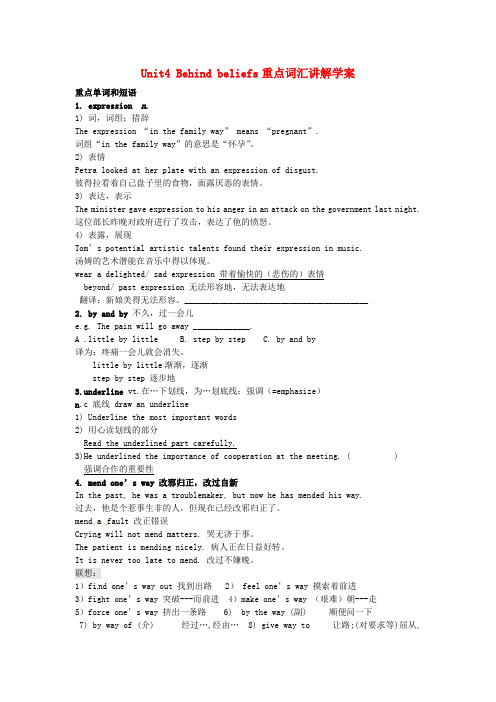
Unit4 Behind beliefs重点词汇讲解学案重点单词和短语1. expression n.1) 词,词组;措辞The expression “in the family way” means “pregnant”.词组“in the family way”的意思是“怀孕”。
2) 表情Petra looked at her plate with an expression of disgust.彼得拉看着自己盘子里的食物,面露厌恶的表情。
3) 表达,表示The minister gave expression to his anger in an attack on the government last night. 这位部长昨晚对政府进行了攻击,表达了他的愤怒。
4) 表露,展现Tom’s potential artistic talents found their expression in music.汤姆的艺术潜能在音乐中得以体现。
wear a delighted/ sad expression 带着愉快的(悲伤的)表情beyond/ past expression 无法形容地,无法表达地翻译:新娘美得无法形容。
__________________________________________2. by and by 不久,过一会儿e.g. The pain will go away _____________.A .little by little B. step by step C. by and by译为:疼痛一会儿就会消失。
little by little渐渐,逐渐step by step 逐步地3.underline vt.在…下划线,为…划底线;强调(=emphasize)n.c 底线 draw an underline1) Underline the most important words2) 用心读划线的部分Read the underlined part carefully.3)He underlined the importance of cooperation at the meeting. ( )强调合作的重要性4. mend one’s way 改邪归正,改过自新In the past, he was a troublemaker, but now he has mended his way.过去,他是个惹事生非的人,但现在已经改邪归正了。
牛津译林版高中英语选修9Unit4 Behind beliefsTask精品教案
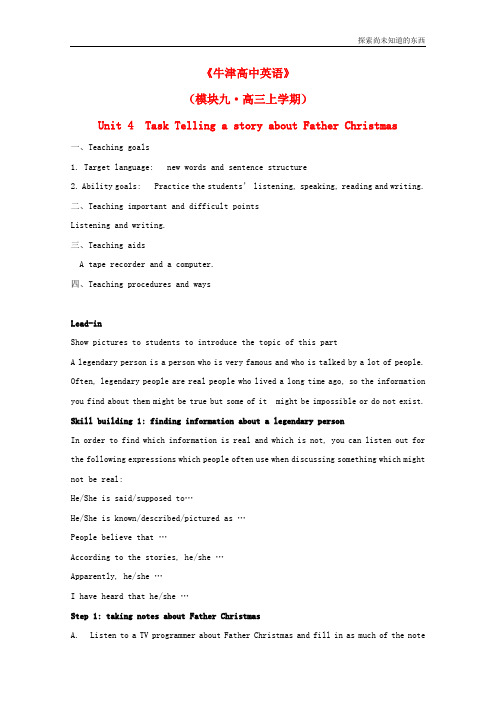
《牛津高中英语》(模块九·高三上学期)Unit 4 Task Telling a story about Father Christmas一、Teaching goals1. Target language: new words and sentence structure2. Ability goals: Practice the students’listening, speaking, reading and writing.二、Teaching important and difficult pointsListening and writing.三、Teaching aidsA tape recorder and a computer.四、Teaching procedures and waysLead-inShow pictures to students to introduce the topic of this partA legendary person is a person who is very famous and who is talked by a lot of people. Often, legendary people are real people who lived a long time ago, so the information you find about them might be true but some of it might be impossible or do not exist. Skill building 1: finding information about a legendary personIn order to find which information is real and which is not, you can listen out for the following expressions which people often use when discussing something which might not be real:He/She is said/supposed to…He/She is known/described/pictured as …People believe that …According to the stories, he/she …Apparently, he/she …I have heard that he/she …Step 1: taking notes about Father ChristmasA. Listen to a TV programmer about Father Christmas and fill in as much of the notesheet as possible.B. Now listen to the second half of the programmer and finish the notes above.Answers: 1) fat 2) white 3) red suit 4) black 5) North 6) toys 7) 12 8) deliver 9)presents 10) tree 11) bed 12) pies 13) green 14) 1931TapescriptHost: Good morning. Today, I am going to interview someone who knows a lot about Father Christmas.Steve Smith is the owner of a toy shop. Now, Steve, I wonder if you could quicklysummarize who Father Christmas is and what he does.Steve: Well, the character Father Christmas has been around for hundreds of years, and he is known to many children around the world as the person who bringsthem Christmas presents. He is often described as a happy, fat man with longwhite hair and a long white beard and moustache, dressed in a red suit witha black belt and black boots. However, he hasn’t always dressed like that.A famous advertisement used a picture of him wearing red in nineteen thirty-one,but before that, he was usually drawn wearing green.Host: Father Christmas comes to visit us at Christmas time, but where does he spend the rest of the years?Steve: Well, he is said to live near the North Pole with his wife and lots of little creatures called elves. The elves are his friends. They help make toys. Healso has twelve reindeer that help him deliver the presents on Christmas Eve.Host: When I was a child, I used to write to Father Christmas, so that he would know what I wanted.Steve: Many children do that several months before Christmas. They write to tell what presents they would like for Christmas. One of the traditions in the UKis for children to take the list of presents they want and put it in the chimney.Host: What happens after that, on Christmas Eve?Steve: According to stories, on Christmas Eve, Father Christmas puts all of the presents onto his sled and flies across the sky with his twelve reindeer. OnceFather Christmas arrives at a house, he goes down the chimney and places presents for the children in stockings or in front of the family Christmas tree. Some people hang the stockings by their beds, but most people hang them by the fireplace. Many people say that Father Christmas likes to eat mince pies, so they always leave some out for him to eat. Many people also leavea carrot out for the reindeer.Host: I didn’t know that! I’ll have to remember that in the future. Now we have time for one more question. Do you know where the idea for Father Christmas came from?Steve: There is a connection between Father Christmas and ST Nicholas, who was a saint from hundreds of years ago. You can find more about ST Nicholas on the Internet.Host: Steve, thanks for talking to us today. I suggest that anyone who wants to find out more about Father Christmas should look on the Internet. There are many sites and there is much information aboutRead the article about Father Christmas on a web about ST Nicholas ON Page 59, and then answer the following questions.1. Where did ST Nicholas come from?--- ST Nicholas came from a village called Myra in Turkey.2. Why is Father Christmas modeled after him?--- Because he was very kind and generous especially to young people.3. What is the origin of Father Christmas coming down the chimney?--- Father Christmas threw small bags of gold down the chimney to help the three daughters in a poor family get married.4. Where did the idea of hanging stockings near the fireplace come from?--- One of his bags of gold fell into a stockings hanging up to dry over the fireplace.5. What does ST Nicholas look like?--- He is tall and thin with no beard and wears the traditional clothes of a priest. Skill building 2: asking questions about cultural differencesStep 2: finding out about different Christmas traditions● Is Father Christmas the same in every Western country?● What is Father Christmas called in different country?● Do people in Western countries all send presents to others on 24 December? Make a dialogue about the questions using the following structure.● Is/Are…the same everywhere?●What is/are …called in each country?● Which…is/are different in each country?● How is/are…different in each country?Skills building 3: writing a story about a legendary figureTips:1. When you write a story a legendary figure, you need a way to start the story to get your readers interested.e.g.● I am going to tell you a story about…● I am sure you have all heard about … Well, I am going to tell a story about him/her.2. Then you need to give descriptions of the legendary figures:Step 3: writing a story about Father Christmas ●Opening sentence_________________● Identity______________________● Appearance____________________● Personality_______________________● Occupation____________________● Origin_____________________● Other interesting facts___________Homework:1. Write a story about Father Christmas.2. Preview Project part.。
高中英语(Unit 4 Behind beliefs)导学案3(无答案)牛津译林版选修9 学案

Module 9 Unit 4 Behind beliefsReading班级:某某:学号:一、明确目标,自主学习1. 学习目标:(1)To improve the ability of reading prehension, learning about the meanings of Biblical idioms in English.(2) To learn to catch the detailed information by self-directed study and cooperation.(3)To master some useful expressions and try to use them freely.2. 预习内容:可以按知识体系设置,最好分层设置A组1. Read the passage。
2. Pay attention to the new words and expressionsB 组1. Read and pay attention to long phrases2. Enlarge the usage of some words and expressionsC组1.Master the different meanings of the similar words and expressions .2.Make the examples of some difficult sentence patterns二、合作释疑,互相研讨Sentence Structures1.An idiom is a group of words or an expression whose meaning often cannot beunderstood by looking at the meanings of the separate words in it. (adj.) (L 1-2)2.(1) 那是一个岛,它的名字我忘了。
高中英语Unit4Behindbeliefs教案7牛津译林版选修9

Unit 4 Behind beliefs科目: 英语主备人: 备课日期:课题Behind beliefs 第5课时计划上课日期Enable students to gain some knowledge about idioms, understand their 教学目标original meanings and learn about their practical usage in English.教学重难点new wo rds and sentence structure教学流程\内容\板书关键点拨加工润色Step1 Gree tingsStep2 RevisionsStep3 Lead-inStep4 Teaching proceduresLanguage po ints1. instruct v.1)命令,指示instruct sb to do sthOur staff have been instructed to offer you every assistance.as instructed 依照指示We returned the questionnaire as instructed.2)教授,指导instruct sb in sthGreater effort is needed to instruct children in road safety.3)(正式)通知instruct sb thatI want you to instruct them that they have to attend an important meetingto attend this afternoon.4)(法律)聘请(律师)出庭Once you have decided to proceed with a case, you should instruct a goodlawyer.2. circumstance n.1)情况,情形I can’t imagine a circumstance in which I would be quarrelling with her.2)under/in no circumstances 决不,无论如何都不Under no circumstances are you to leave the house.3)in/under the circumstances 在这种情况下,既然如此The result was the best that could be expected under the circumstances.4)无法控制的因素,环境,境遇Force of circumstance compelled us to leave. 形势所迫,我们不得不走。
牛津译林版高中英语选修9Unit 4Behind beliefsWelcome to the unit教案1
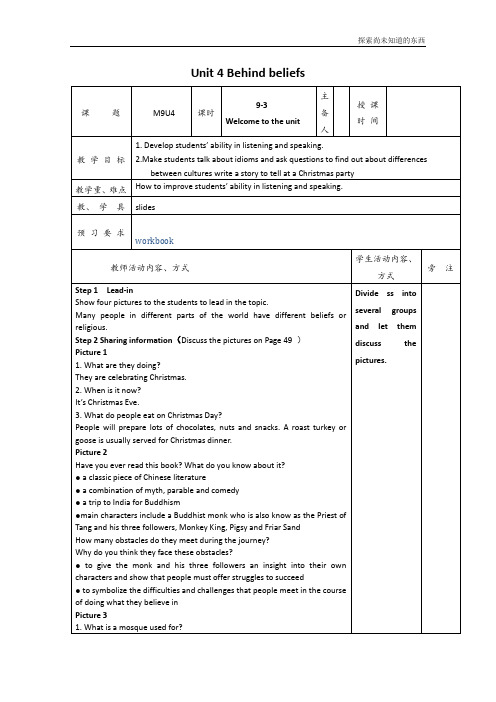
课题
M9U4
课时
9-3
Welcometo the unit
主备人
授课时间
教学目标
1. Develop students’ ability in listening and speaking.
2.Make studentstalk about idioms and ask questions to find out about differences between cultures write a story to tell at a Christmas party
Muslims (Eid, The festival of sacrifice, Forgiveness Day)
Step4Homework:
1. Search and discuss more knowledge about beliefs.
2. Preview the reading part.
教学重、难点
How to improve students’ ability in listening and speaking.
教、学具
slides
预习要求
教师活动内容、方式
学生活动内容、方式
旁注
Step1Lead-in
Show four pictures to the students to lead in the topic.
Hinduism印度教Judaism犹太教Buddhism佛教Islam伊斯兰教
3.Do you know any famous religious places?
The Mogao Grottoes (Dunhuang, Gansu )
英语:unit4 behind beliefs单元学案(牛津译林版版选修9)

14.______________n.乡村小屋;村舍
14.________________扔掉
15.______________v.偶然听到;偷听到
15.________________完全理解
16.____________adj.胡子刮得干净的;无胡须的
16.________________梦到
6.________________经过一段时间
7.______________ n.疾病7._________________
以......为中心
8.______________n.负担;重负8._________________正
因如此
9._______________ n.主教9._________________换
6.I________________________(做梦也没想到我会有机会)tobesentabroad
very soon.
7.Mydaughterisnotpresent,so_______________________________(我代他
领奖)。
8.Aftertheearthquakeandthefire,__________________________(寒舍所
17.______________n.髭;八字胡
17.________________醒来
18._____________adv.朝西;向西18._________________
提醒某人某事
19._____________n.薪水;薪金19.________________
使用之中;使用着_______西游
剩无几)。
9.Dickens’novels______________________________________(已被翻译
高中英语 Unit 4 Behind beliefs SectionⅢ学案 牛津译林版选修9

Unit 4 Behind beliefsSection ⅢTask & Project7.houses 8.attractions 9.historic 10.state1.This proverb is usually shortened to “great minds think alike”. 这个俗语通常被缩减为“英雄所见略同”。
shorten vt .截短,使变短,缩减My dress is too long.I must shorten it.我的连衣裙太长了,我得把它截短些。
Envy and wrath shorten life.嫉妒和愤怒会缩短生命。
short adj .短的;矮的 in short 简而言之 be short of 短缺……类似这种变化的单词有:long→ length→ lengthen wide → width→ widen strong →strength →strengthen 等Behind him came a rather short man in a black business suit.随后跟进一个穿了一身黑色商人服装的矮小男子。
Hilary went to the bank because she was short of money.希拉里去银行取钱,因为她缺钱用。
In short ,everyone behaved with sense.总而言之,每个人都表现得富于理智。
The days begin to ______ after July.A .be shortenB .be shortC .shortenD .short提示:句意为“7月之后白天开始变短”。
A 项形式不对;B 项意思变成“7月之后白天是短的”,意思不对;D 项short 为形容词,不能放在动词不定式符号to 的后面。
答案:C2.Don't count on something going well until it happens.在事情还没有发生之前,不要指望太好。
高中英语Unit4Behindbeliefs教案9牛津译林版选修9201701261128.doc

Unit 4 Behind beliefs科目: 英语主备人: 备课日期:Enable students to discuss their knowledge abou t beliefs or religious,Although analogy can be very hard to guess, clues can often b e foundYou should first look at tThen lo ok analogyarriv ed out of thet)Answers: 1.j 2.b 3.a 4.c 5.e 6.d 7.f 8. h 9. g 10. Answers: (1) group (2) idioms (3) translatep VII DiscussionDo you know the origins of any Chinese idio ms? What are they?The twins share one room, but they sleep in separate beds.品味人生1、不管鸟的翅膀多么完美,如果不凭借空气,鸟就永远飞不到高空。
想象力是翅膀,客观实际是空气,只有两方面紧密结合,才能取得显着成绩。
2、想停下来深情地沉湎一番,怎奈行驶的船却没有铁锚;想回过头去重温旧梦,怎奈身后早已没有了归途。
因为时间的钟摆一刻也不曾停顿过,所以生命便赋予我们将在汹涌的大潮之中不停地颠簸。
3、真正痛苦的人,却在笑脸的背后,流着别人无法知道的眼泪,生活中我们笑得比谁都开心,可是当所有的人潮散去的时候,我们比谁都落寂。
4、温暖是飘飘洒洒的春雨;温暖是写在脸上的笑影;温暖是义无反顾的响应;温暖是一丝不苟的配合。
5、幸福,是一种人生的感悟,一种个人的体验。
也许,幸福是你风尘仆仆走进家门时亲切的笑脸;也许,幸福是你卧病床上百无聊赖时温馨的问候;也许,幸福是你屡遭挫折心灰意冷时劝慰的话语;也许,幸福是你历经艰辛获得成功时赞赏的掌声。
高中英语Unit4Behindbeliefs教案2牛津译林版选修9
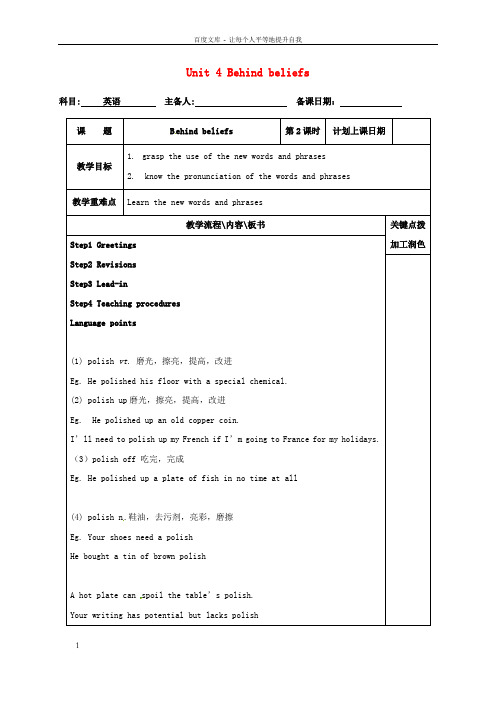
Unit 4 Behind beliefs科目: 英语主备人: 备课日期:课题B ehind beliefs 第2课时计划上课日期1.grasp the use of the new words and phrases教学目标2. know the pronunciation of the words and phrases教学重难点Learn the new words and phrases教学流程\内容\板书关键点拨加工润色Step1 GreetingsStep2 RevisionsStep3 Lead-inStep4 Teaching proceduresLanguage points(1) polish vt.磨光,擦亮,提高,改进Eg. He polished his floor with a special chemical.(2) polish up磨光,擦亮,提高,改进Eg. He polished up an old copper coin.I’ll need to polish up my French if I’m going to France for my holidays.(3)polish off 吃完,完成Eg. He polished up a plate of fish in no time at all(4) polish n.鞋油,去污剂,亮彩,磨擦Eg. Your shoes need a polishHe bought a tin of brown polishA hot plate can spoil the table’s polish.Your writing has potential but lacks polish2. figure(1)figure n.数字;钱数Eg. His score is now well into double figures.It is estimated that his property is up to a figure of $200 million. (2)figure n. 体形,体态How does she manage to ke ep her figure when she eats so much?(3)figure n.人物,重要人物He was the outstanding political figure of his time.(4)figure n.人影I can’t make out a dark figure in the distance.(5)figure v. (经过思考后)认为,以为I figured that he was drunk and shouldn’t be allowed to drive.(6)figure v.计算Larry figured his expenses for the past month.词组:figure out 想出,理解(某事)Can you figure out how to do itIt took me hours to figure those algebra problems out.3. in other words 换言之,也就是说In other words, our o bjective is to avoid los ing.拓展:1)find the words 用恰当的语言表达She only wished she could find the words to express her affection for th e old man.2)keep one’s word 信守诺言Gail kept her word and returned all the money.3)in a word 总之,一句话,简言之-----Do you enjoy the film?-----In a word—no.4)word for word 逐字逐句The newspaper printed his speech more or less word for word. 5)have a word with sb. 与某人交谈Could I have a word with you after the meeting?6)have words with sb, 与某争吵Yesterday he had words with his classmate a bout a small thing. Step5 PracticeStep6 Summary作业布置。
牛津译林版英语高三Module9《Unit4Behindbeliefs》word学案
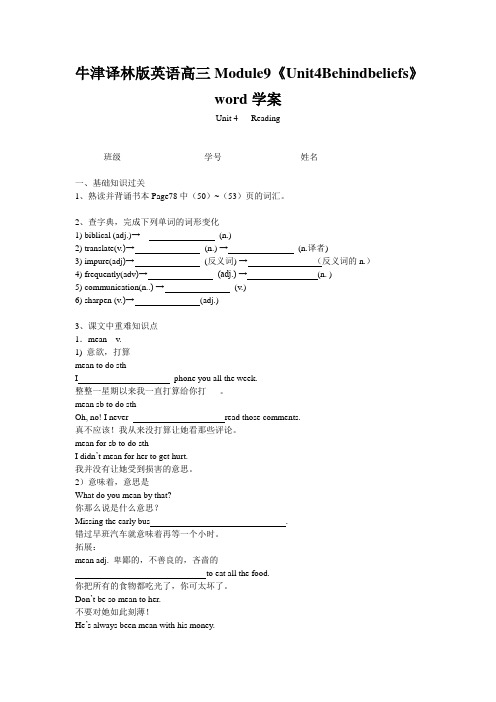
牛津译林版英语高三Module9《Unit4Behindbeliefs》word学案Unit 4 Reading班级_________________ 学号_________________ 姓名_________________一、基础知识过关1、熟读并背诵书本Page78中(50)~(53)页的词汇。
2、查字典,完成下列单词的词形变化1) biblical (adj.)→(n.)2) translate(v.)→(n.) →(n.译者)3) impure(adj)→(反义词) →(反义词的n.)4) frequently(adv)→(adj.) →(n. )5) communication(n..) →(v.)6) sharpen (v.)→(adj.)3、课文中重难知识点1.mean v.1) 意欲,打算mean to do sthI phone you all the week.整整一星期以来我一直打算给你打。
mean sb to do sthOh, no! I never read those comments.真不应该!我从来没打算让她看那些评论。
mean for sb to do sthI didn’t mean for her to get hurt.我并没有让她受到损害的意思。
2)意味着,意思是What do you mean by that?你那么说是什么意思?Missing the early bus .错过早班汽车就意味着再等一个小时。
拓展:mean adj. 卑鄙的,不善良的,吝啬的to eat all the food.你把所有的食物都吃光了,你可太坏了。
Don’t be so mean to her.不要对她如此刻薄!He’s always been mean with his money.他对钱总是专门吝啬。
决不,一点也不通过某方法/手段2.underline及物动词vt.1). 在...的下面划线The key words .关键的字下面划了线。
- 1、下载文档前请自行甄别文档内容的完整性,平台不提供额外的编辑、内容补充、找答案等附加服务。
- 2、"仅部分预览"的文档,不可在线预览部分如存在完整性等问题,可反馈申请退款(可完整预览的文档不适用该条件!)。
- 3、如文档侵犯您的权益,请联系客服反馈,我们会尽快为您处理(人工客服工作时间:9:00-18:30)。
高三英语学案(M 9) U 4 Project
学习目标:掌握Project中的重点单词、短语及句型的用法并能熟练运用。
【自主探究】
1. 在中国中东部
2. 直到今天
3. 梦见一个金人飞行于宫殿之上
4. 照亮了整个宫殿
5. 醒来
7. 为外国使臣提供住处 8. 对…做出改变
9. 官舍/官署 10. 仍在使用中
11.白马寺建筑群 12.代表
13. 形状像…… 14. 十三层的大楼
15. 白马寺历史悠久,它曾屡经修缮,多次扩建,这些修缮与扩建通常是在战争和灾难之后。
16. 对于中国人民和中国历史来说,白马寺具有重要意义,正因如此,它被政府列为首批受国家重点保护的历
史建筑。
17. 白马寺也是洛阳最著名的旅游胜地之一,它将一如既往地成为一个受欢迎的旅游胜地。
【重点点拨】
1. The officials traveled westwards to Central Asia and arrived in what is today Afghanistan. 这群大臣西行至中亚,到达今天的阿富汗一带。
思维训练:what 引导的从句是,what在从句中作。
what 常引导名词性从句,并在名词性从句中作主语、宾语、表语或定语,意思为:什么,所…的。
Practice: 分析下面句子中what从句是什么从句,what在从句中充当什么成分?
1) Our city is different from what it was five years ago.
2) A modern city has sprung up in what was a wasteland ten years ago.
3) What measures I shall take is none of your business.
4) Men usually go straight to what they want and leave quickly when shopping.
2. It’s said that if you stand about 20 meters away from ……, you will hear the sounds repeated
and multiplied from the roof, just like frogs croaking.
据说如果站在离塔20米远的地方击掌,可以听到屋顶传来的放大的声音,声声回荡,类似蛙鸣。
hear vt.[不用进行时] 1、hear+宾+宾补(不加to的不定式, v-ing 或 v-ed)
▲hear … do 表示动作的全过程
We heard him sing in the next room.=He was heard in the next room.
▲hear…doing 表示正在进行
Now, we can hear him singing in the next room.
▲hear....done 表示听到…被…
We heard the song sung in English.
我刚才听到小石块击打玻璃的声音。
I heard the glass (beat)by the stones.
The managers discuss the plan that they would like to see_ _the next year.
A. carry out
B. carrying out
C. carried out
D. to carry out
▲hear + that从句听说、得知
I was surprised to hear that he was married..
vi. hear of \about 听见、听到 hear from收到(某人)来信(来电)
【反馈练习】
1.Mr King cannot be here, so his wife will (代表他领奖).
2. They raised money and built a new school on behalf of the children in the poor village.(翻译)
3. – Where did you get to know him? – It was on the farm (that/where) we worked.
4. It was (直到…才) he came back from Africa that year he met the girl he would like
to marry.
5. It was after he came back from Africa (where/that) he had stayed for 10 years (that/when) he met the girl he would like to marry.
6. ---- that he managed to get the information?
---- Oh, a friend of his helped him.
A. Where was it
B. What was it
C. How was it
D. Why was it
7. The car Tom was was once his uncle.
A. in possession of; in the possession of
B. in the possession of; in possession of
C. in possession of ; in possession of
D. in the possession of; in the possession of
8. Under no circumstances to separate from the mainland.
A. Taiwan is allowed
B. does Taiwan allow
C. is Taiwan allowed
D. Taiwan allows
9.In the 16th century, village life centered around religion. (翻译)
10. (center) around her children and family, her life is busy and boring.
11.大树底下坐着一位我以前从未见过的老人。
12. 山顶耸立着一颗大树。
